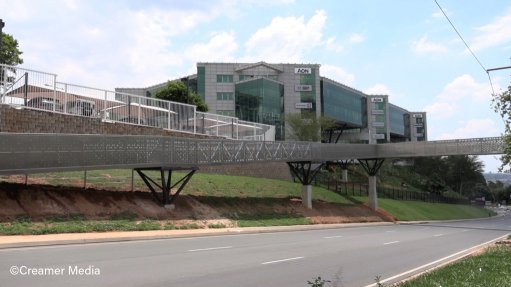Survey indicates insufficient infrastructure projects, calls for collaboration
According to the latest Graduate Professional Index (GPI) released by the Professional Provident Society (PPS), South Africa’s built environment and infrastructure sector is at a critical crossroads.
The PPS expresses that the “alarming state” of infrastructure and the acute shortage of new projects threaten the nation’s stability, highlighting the urgent need for a unified approach to revitalising this vital industry.
The latest GPI shows that almost two-thirds of graduate professionals working in this industry, and who participated in the survey, believe there are insufficient infrastructure projects in the country to sustain the sector.
A total of 1 598 graduate professionals participated in the survey conducted in early 2024.
While graduate professionals play an essential role in planning, designing and maintaining the nation’s infrastructure, only 15% of respondents believe there are sufficient projects to sustain the sector.
With 69% disagreeing, the PPS says the data highlights a significant shortfall in opportunities.
The PPS notes that, adding to these challenges, the South African Institution of Civil Engineering (SAICE) awarded the country’s public infrastructure an unprecedented low grade of D in 2022.
The PPS explains that chronic underinvestment, neglect and the redirection of funds during the Covid-19 pandemic have exacerbated the sector’s decline.
It also points out that municipalities owe creditors nearly R90-billion, while struggling with R255-billion in unpaid debts from customers, further impeding infrastructure maintenance and renewal.
Of the 1 598 survey respondents, 56% were male and 44% female, with a diverse age range: 3% aged 18 to 24; 28% aged 25 to 34; 26% aged 35 to 49; 35% aged 50 to 64; and 7% aged 65 or older.
The GPI shows that the construction industry, traditionally a major driver of employment, is also feeling the strain, with 63% of graduate professionals reporting a decline in large building projects.
Statistics South Africa’s (StatsSA’s) data shows that about 118 000 construction jobs were lost between 2017 and 2020.
The PPS says high-profile disruptions, such as the R17.4-billion in cancelled South African National Roads Agency Limited projects, reflect inefficiencies and poor governance in tender processes.
It notes that the lack of infrastructure investment has curtailed economic growth, limited job creation and deepened unemployment, particularly among the youth.
“South Africa’s infrastructure backlog and maintenance crisis hinder service delivery and fuel public dissatisfaction,” it says.
The PPS posits that the solution lies in a bold, collaborative strategy aligned with the Group of 20 (G20) objectives to address South Africa’s infrastructure challenges.
This includes accelerated infrastructure investment to forge partnerships between government and the private sector to unlock funding for sustainable and impactful projects, as well as streamlined processes to cut through bureaucratic red tape to fast-track project approvals and deliver infrastructure on time.
This also includes innovation through collaboration to leverage partnerships among academia, industry and government to design climate-resilient, future-proof infrastructure; as well as empowering graduate professionals by developing a pipeline of infrastructure projects that create meaningful opportunities for South Africa’s talented graduates to drive progress.
“The built environment sector is the backbone of our country’s development. The current shortage of projects not only hampers economic growth but also affects the career prospects of our talented graduate professionals. We must act now to address these challenges and ensure a thriving future for South Africa,” says PPS technical marketing head Motshabi Nomvethe.
“It is time for South Africa to claim its position as a leader in sustainable, inclusive development. By aligning national priorities with the G20’s strategic framework and promoting public-private partnerships, the built environment sector can become the foundation of a thriving economy,” the PPS expresses.
Article Enquiry
Email Article
Save Article
Feedback
To advertise email advertising@creamermedia.co.za or click here
Comments
Press Office
Announcements
What's On
Subscribe to improve your user experience...
Option 1 (equivalent of R125 a month):
Receive a weekly copy of Creamer Media's Engineering News & Mining Weekly magazine
(print copy for those in South Africa and e-magazine for those outside of South Africa)
Receive daily email newsletters
Access to full search results
Access archive of magazine back copies
Access to Projects in Progress
Access to ONE Research Report of your choice in PDF format
Option 2 (equivalent of R375 a month):
All benefits from Option 1
PLUS
Access to Creamer Media's Research Channel Africa for ALL Research Reports, in PDF format, on various industrial and mining sectors
including Electricity; Water; Energy Transition; Hydrogen; Roads, Rail and Ports; Coal; Gold; Platinum; Battery Metals; etc.
Already a subscriber?
Forgotten your password?
Receive weekly copy of Creamer Media's Engineering News & Mining Weekly magazine (print copy for those in South Africa and e-magazine for those outside of South Africa)
➕
Recieve daily email newsletters
➕
Access to full search results
➕
Access archive of magazine back copies
➕
Access to Projects in Progress
➕
Access to ONE Research Report of your choice in PDF format
RESEARCH CHANNEL AFRICA
R4500 (equivalent of R375 a month)
SUBSCRIBEAll benefits from Option 1
➕
Access to Creamer Media's Research Channel Africa for ALL Research Reports on various industrial and mining sectors, in PDF format, including on:
Electricity
➕
Water
➕
Energy Transition
➕
Hydrogen
➕
Roads, Rail and Ports
➕
Coal
➕
Gold
➕
Platinum
➕
Battery Metals
➕
etc.
Receive all benefits from Option 1 or Option 2 delivered to numerous people at your company
➕
Multiple User names and Passwords for simultaneous log-ins
➕
Intranet integration access to all in your organisation














